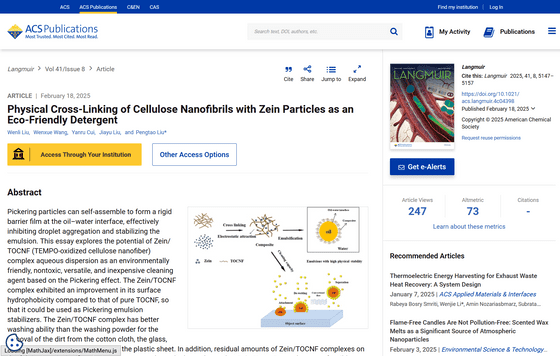Detergent made from wood and corn

From laundry detergent to dishwashing detergent, detergents are an essential part of our lives. However, the chemicals used in these detergents are difficult to decompose and can cause algae to grow, which can change the ecosystem. Researchers are therefore working to develop 'environmentally friendly detergents.' Meanwhile, Chinese researchers have revealed that they have succeeded in making detergent from wood and corn protein.
Physical Cross-Linking of Cellulose Nanofibrils with Zein Particles as an Eco-Friendly Detergent | Langmuir

Researchers create eco-friendly detergent from wood fiber and corn protein - American Chemical Society
Chemicals used as surfactants, such asalkylphenol ethoxylates , are considered 'environmental hormones' that affect the hormone activity of living organisms, and in recent years, efforts have been made to replace these substances with environmentally and biologically friendly substances. However, environmentally friendly detergents are difficult to manufacture and difficult to rinse off, which not only increases production and retail costs, but also has the potential to damage the surfaces and fibers of clothes and dishes. Therefore, effective alternatives that are low-cost and easy to manufacture, and are gentle on both the environment and the items being cleaned, are desirable.
To address this need, Wenli Liu and his colleagues at Tianjin University of Science and Technology have developed an environmentally friendly detergent made from ingredients found in abundant renewable resources.
Liu and his team devised a new liquid that combines tiny cellulose fibers extracted from wood with zein, the main protein in corn. In tests to clean cotton fabrics stained with ink, chili oil, and tomato paste, they found that a 1% concentration of the liquid was less effective than conventional detergents, but a 5% concentration was more effective at removing stains than a 1% concentration of detergent. What's more, it didn't leave any residue on the cotton fabric.

In addition, when the cellulose/zein detergent was tested for its ability to remove grease from ceramic, stainless steel, glass, and plastic dishes, it was found that it had similar cleaning power to commercial dishwashing detergents at the same dilution. For example, on a stainless steel plate, a 5% solution of cellulose/zein removed 92% of the dirt, while a 1% solution of commercial dishwashing detergent removed 87% of the dirt. From this, it was concluded that if the concentration of the cellulose/zein detergent was increased to 5%, it would have better cleaning power than commercial detergents.
According to Liu and his team, cellulosic fibers can attract and repel water, while zein traps oils, making them more effective than conventional detergents.

'Our results suggest that our cellulose-zein detergent could be an efficient, cost-effective and sustainable alternative to current synthetic detergents on the market,' Liu and his colleagues said.
Related Posts:
in Science, Posted by log1p_kr







